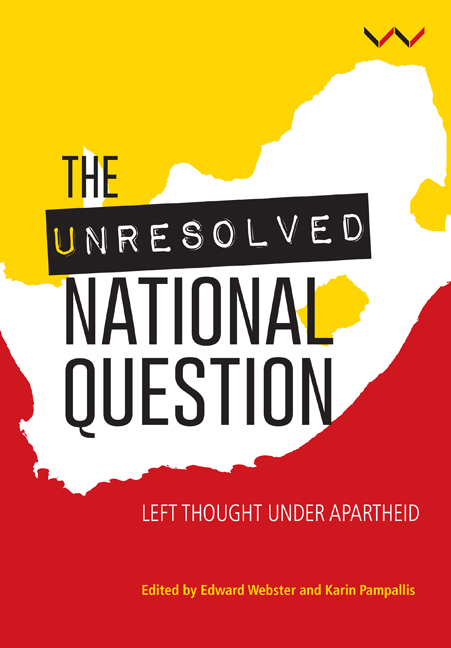Book contents
- Frontmatter
- Contents
- Acronyms and Abbreviations
- Preface: Edward Webster and Karin Pampallis
- Introduction: Revisiting the National Question
- PART ONE KEY FOUNDATIONAL TRADITIONS
- PART TWO CONTINUITY AND RUPTURE
- Chapter 6 Vicissitudes of the National Question: Afrikaner Style
- Chapter 7 Neville Alexander and the National Question
- Chapter 8 The Marxist Workers’ Tendency of the African National Congress
- Chapter 9 The National Question confronts the Ethnic Question
- Chapter 10 Variations on a Zulu Theme
- Chapter 11 Black Consciousness as Nationalism of a Special Type
- Chapter 12 Postponing the National Question: Feminism and the Women's Movement
- Chapter 13 Workerists and the National Question
- Chapter 14 Red, Black and Gold: FOSATU, South African ‘Workerism’, Syndicalism and the Nation
- Chapter 15 National Democratic Revolution meets Constitutional Democracy
- Biographical Notes
- Index
Chapter 12 - Postponing the National Question: Feminism and the Women's Movement
from PART TWO - CONTINUITY AND RUPTURE
Published online by Cambridge University Press: 21 April 2018
- Frontmatter
- Contents
- Acronyms and Abbreviations
- Preface: Edward Webster and Karin Pampallis
- Introduction: Revisiting the National Question
- PART ONE KEY FOUNDATIONAL TRADITIONS
- PART TWO CONTINUITY AND RUPTURE
- Chapter 6 Vicissitudes of the National Question: Afrikaner Style
- Chapter 7 Neville Alexander and the National Question
- Chapter 8 The Marxist Workers’ Tendency of the African National Congress
- Chapter 9 The National Question confronts the Ethnic Question
- Chapter 10 Variations on a Zulu Theme
- Chapter 11 Black Consciousness as Nationalism of a Special Type
- Chapter 12 Postponing the National Question: Feminism and the Women's Movement
- Chapter 13 Workerists and the National Question
- Chapter 14 Red, Black and Gold: FOSATU, South African ‘Workerism’, Syndicalism and the Nation
- Chapter 15 National Democratic Revolution meets Constitutional Democracy
- Biographical Notes
- Index
Summary
The ‘Women Question’ remains, arguably, the most unresolved in the history of democratic thought and practice in South Africa. In tracing the articulations of this question through the twentieth century and into the period of democracy it is evident that the dominant narratives of nationalist and class struggle relegated the demands for a society free of gender domination to a secondary status both in intellectual reasoning and in political projects. Although women were always participants in politics, it was only in moments of extraordinary mobilisation by women themselves that advances were made in defining an agenda for a good and just society in ways that referenced the particular, often-invisible conditions needed to liberate women. Indeed, the very idea of women's liberation was postponed to an indefinite future.
The subject of this discussion – women – is not definable without reference to a range of other markers such as class, ethnicity and race. The cultural meanings of ‘woman’ shift in relation to these markers of identity, and work in tandem with the ways in which capitalism mobilises ideologies of gender to normalise systems of economic exploitation. Although some women's movements, and some forms of feminism, have identified the elimination of patriarchy as the common interest of all women, patriarchy itself cannot be understood in ahistorical terms as separate from capitalism. Postcolonial feminists have argued that the ideological content of feminist consciousness should not be specified a priori according to abstract definitions. The archive of feminism, they argue, presents itself as universal but is indelibly marked by the specific historical trajectories of Western colonial-capitalist development. In this chapter, I therefore follow Chandra Mohanty's (1991) advice and attempt to offer a discussion of women's struggles that is set not against a prescriptive test of ideological conformity but, rather, within the specific historical experience and political culture of South Africa. I suggest that as a working, open-ended definition feminism is the project of examining the particular ways in which power operates between the political, economic and social spheres. It is the complex interaction between these spheres that reveals how gender works to mark power and resource distributions.
- Type
- Chapter
- Information
- The Unresolved National Question in South AfricaLeft Thought Under Apartheid, pp. 217 - 234Publisher: Wits University PressPrint publication year: 2017



